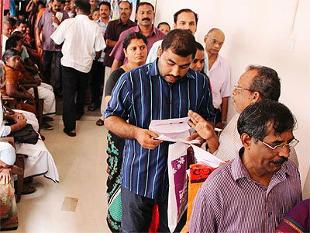
NEW DELHI: Days after Supreme Court's ruling that said Aadhaar cannot be made mandatory for availing government benefits, the Union Cabinet gave a go-ahead to the National Identification Authority of India Bill with minor amendments on Tuesday.
The Bill will now be placed before the Rajya Sabha for discussion during the winter session. Once approved by Parliament, the law will provide statutory status to the Unique Identification Authority of India (UIDAI), which functions under the Planning Commission.
UIDAI, which has been mandated to issue 12-digit Aadhaar numbers to 60 crore residents by 2014, currently operates through an executive order. The new law seeks to create a National Identification Authority of India, which will oversee implementation of the Aadhaar project. It also seeks to define penalties in case of misuse of data collected under the project.
According to a senior government official, who did not wish to be identified, the amended Bill addresses the issue of whether the UIDAI can enroll all residents or Indian nationals only, an issue raised by the Supreme Court.
"The Aadhaar number can be issued to any resident, including foreign nationals. It does not confers any rights regarding citizenship or domicile or any other right as per Section 6 of the Bill," the official explained. "Aadhaar establishes the identity of a person and not the nationality. It also serves as proof of residence. Moreover, it is a voluntary facility and not mandatory," the official clarified.
The Supreme Court in its interim order last month had said that Aadhaar number should not be given to illegal immigrants. The Bill was first approved by the Cabinet in 2010 and introduced in the Rajya Sabha in December that year. It was sent for scrutiny to the Parliamentary Standing Committee on Finance headed by former finance minister and BJP leader Yashwant Sinha.
The committee had raised concerns about the policy, concept and expenditure of the authority. As on September 30, the UIDAI had incurred an expenditure of Rs 3,490 crore. However, the entire project cost was envisaged at Rs 12,398 crore. The authority has already enrolled around 44 crore residents across 18 states where it operates.
It has been mandated to enroll and collect biometric data of 60 crore residents across 18 states, while data of the remaining 61 crore population would be collected under the National Population Register programme. The 12-digitnumber for the entire 121 crore population will be generated by the UIDAI.
UID against rural poor?
RTI activist Aruna Roy has told the Supreme Court that the Unique Identification being assigned to every citizen is loaded against the rural poor. The cash payments being planned depend on a banking network in every remote part of the country, said Roy, in a petition filed along with other activists on Monday.
The dependence on machines, need for high-quality internet connectivity and vital role played by unaccountable private operators makes the system a potential nightmare for the intended beneficiaries," the petition said.